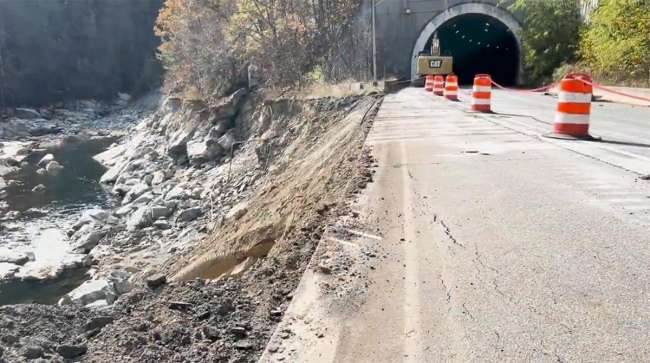With I-40 Closed, Truckers Find Mountain Roads Tricky

[Stay on top of transportation news: Get TTNews in your inbox.]
The closure of Interstate 40 through the Pigeon River Gorge after Hurricane Helene has created challenges for some tractor-trailer drivers going between North Carolina and Tennessee.
Too many of them are ending up on two-lane mountain roads where they crawl along and sometimes get stuck. Officials from both states are urging through drivers to use only approved truck routes and to not blindly heed their computer navigation systems.
“Some trucks are following GPS routes that are programmed for passenger vehicles,” said NCDOT spokesman David Uchiyama. “Those are routes that accommodate passenger vehicles. But they’re steep, winding, curvy roads, not built for trucks.”
I-40 has been closed near the North Carolina/Tennessee line since Sept. 27, when flooding from the remnants of Helene washed away more than a mile of the eastbound lanes. The closure severed the busiest link between the two states, which handled more than 25,000 vehicles a day, many of them tractor-trailer trucks.
While several miles remain closed due to damage from #HeleneNC, crews continue to make progress on I-40 through the Pigeon River Gorge. pic.twitter.com/KOyOWfRywJ — NCDOT (@NCDOT) November 16, 2024
Since then, both states have tried to warn drivers they need to take alternate routes, using social media, cellphone and truck cab alerts, and numerous electronic signs scattered around the region. DriveNC, NCDOT’s website with the latest information about driving conditions in the state, now includes a “truck closure” icon to highlight roads where vehicles longer than 30 feet are prohibited but have gotten stuck (about two dozen so far).
It hasn’t always worked.
Some Carolina-bound truck drivers head east on I-40 right up to where the road closes near the state line, where they’re forced to retreat, says Lt. Bill Miller of the Tennessee Highway Patrol.
“Many truck drivers are ignoring the signs posted on I-40 East daily for one reason or another,” Miller wrote in an email. “They then get turned around and continue to rely on their GPS, and they are routed to secondary roads in Cocke County, such as Big Creek Road and Hartford Road. These roads are small and are not wide enough to accept commercial traffic.”
Wayward tractor-trailers in the mountains are not new. Whenever a snow storm or a crash gums up traffic on I-40 through the gorge, drivers look for alternative routes that sometimes get them into trouble, Uchiyama said.
NCDOT had to put up new warning signs after it found trucks trying to use N.C. 209 between I-40 and Hot Springs, including a stretch through Pisgah National Forest known as The Rattler because of its numerous twists and turns.
But it has gotten worse since Helene.
The problem is not that mountain roads were somehow rendered less truck friendly by Helene. Trucks are ending up on roads that have always been closed to big trucks, said 1st Sgt. Chris Knox, spokesman for the State Highway Patrol.
State troopers on both sides of the border have tried to discourage drivers from using non-truck routes by ticketing them. In one day last week, the State Highway Patrol issued more than 100 citations to truckers using non-truck routes, a number NCDOT broadcast on a Facebook post directed at trucking groups.
“We don’t want to issue citations,” Knox said in an interview. “But we don’t want to see them stuck or turned around or overturned. That further complicates people navigating those roads who should be on those roads.”
Officials on both sides of the state line say there are fewer trucks on non-truck routes than there were in the weeks after Helene. The partial reopening of Interstate 26 in Erwin, Tenn., on Oct. 30 gave truckers an alternative to I-40, though traffic will be narrowed to one lane in each direction for the foreseeable future as bridges over the Nolichucky River are rebuilt.
Want more news? Listen to today's daily briefing above or go here for more info
NCDOT anticipates partially reopening I-40 through Pigeon River Gorge around the first of the year. It plans to convert the westbound lanes to two-way traffic by putting a concrete barrier down the middle and reducing the speed limit to 40 mph.
“All drivers need to keep in mind it will be slow going,” Uchiyama said.
In the meantime, NCDOT recommends truckers and others just passing through Western North Carolina use one of two routes to and from Tennessee: I-77 to I-81 or U.S. 74.
Distributed by Tribune Content Agency, LLC




